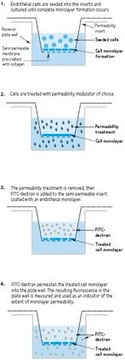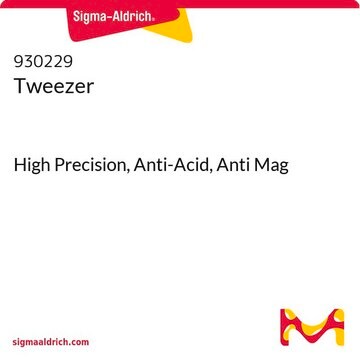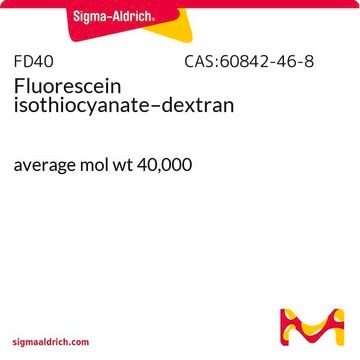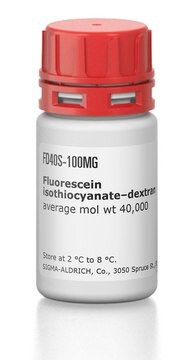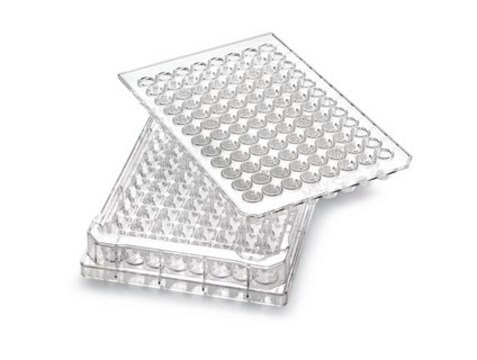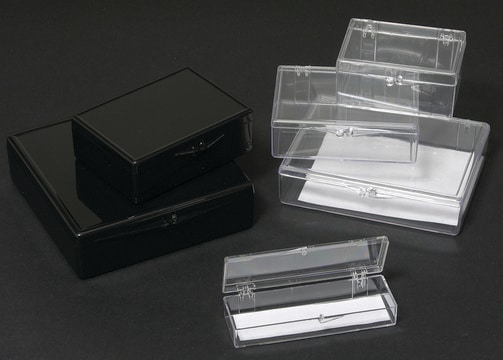ECM644
In Vitro Vascular Permeability Assay (24-well)
This In Vitro Vascular Permeability Assay kit employs a 24-well plate and provides an efficient system for evaluating the effects of chemicals & drug compounds on endothelial cell adsorption, transport & permeability.
Synonym(s):
Vascular permeability assay
Sign Into View Organizational & Contract Pricing
All Photos(1)
About This Item
UNSPSC Code:
12352207
eCl@ss:
32161000
NACRES:
NA.32
Recommended Products
Quality Level
species reactivity (predicted by homology)
all
manufacturer/tradename
Chemicon®
technique(s)
cell based assay: suitable
detection method
fluorometric
shipped in
wet ice
Application
Research Category
Cell Structure
Cell Structure
The Millipore® In Vitro Vascular Permeability Assay kit provides an efficient system for evaluating the effects of chemicals and drug compounds on endothelial cell adsorption, transport, and permeability. It is ideal for measuring compounds that may disrupt or protect an endothelial monolayer. Each In Vitro Vascular Permeability Assay Kit contains sufficient reagents for the evaluation of 24 samples. The In Vitro Vascular Permeability Assay Kit is intended for research use only, not for diagnostic or therapeutic applications.
This In Vitro Vascular Permeability Assay kit employs a 24-well plate and provides an efficient system for evaluating the effects of chemicals & drug compounds on endothelial cell adsorption, transport & permeability.
Components
24-Well Permeability Insert Assembly, Collagen-coated: One 24-well receiver tray containing 24 porous cell culture inserts pre-coated with type I rat-tail collagen.
Receiver Tray, 24-Well: Two 24-well plates.
FITC-Dextran Solution: One vial containing 250 µL.
Forceps: One set of forceps.
Cell Stain: One bottle containing 10 mL.
Black Plate, 96-Well Opaque: One 96-well plate.
Receiver Tray, 24-Well: Two 24-well plates.
FITC-Dextran Solution: One vial containing 250 µL.
Forceps: One set of forceps.
Cell Stain: One bottle containing 10 mL.
Black Plate, 96-Well Opaque: One 96-well plate.
Linkage
Replaces: ECM640
Storage and Stability
Store kit materials at 2-8°C; use within 4 months from date of receipt. Do not freeze.
Legal Information
CHEMICON is a registered trademark of Merck KGaA, Darmstadt, Germany
Millipore is a registered trademark of Merck KGaA, Darmstadt, Germany
Disclaimer
Unless otherwise stated in our catalog or other company documentation accompanying the product(s), our products are intended for research use only and are not to be used for any other purpose, which includes but is not limited to, unauthorized commercial uses, in vitro diagnostic uses, ex vivo or in vivo therapeutic uses or any type of consumption or application to humans or animals.
Storage Class
10-13 - German Storage Class 10 to 13
wgk_germany
WGK 3
Certificates of Analysis (COA)
Search for Certificates of Analysis (COA) by entering the products Lot/Batch Number. Lot and Batch Numbers can be found on a product’s label following the words ‘Lot’ or ‘Batch’.
Already Own This Product?
Find documentation for the products that you have recently purchased in the Document Library.
Customers Also Viewed
Sabrina Rohringer et al.
PloS one, 9(12), e114806-e114806 (2014-12-17)
Extracorporeal shockwave treatment was shown to improve orthopaedic diseases and wound healing and to stimulate lymphangiogenesis in vivo. The aim of this study was to investigate in vitro shockwave treatment (IVSWT) effects on lymphatic endothelial cell (LEC) behavior and lymphangiogenesis.
Ik-Soo Lee et al.
Bioscience, biotechnology, and biochemistry, 79(4), 581-586 (2014-12-17)
In our continuing search for novel antiangiogenic agents, a new lignan glycoside, (7R,8R)-1-(4-O-β-d-glucopyranosyl-3-methoxyphenyl)-2-{2-methoxy-4-[1-(E)-propene-3-ol]-phenoxyl}-propane-1,3-diol (1), along with three known lignans (2-4), were isolated from the 80% EtOH extract of Brandisia hancei stems and leaves. These isolates (1-4) were subjected to an
Dan Shi et al.
Arteriosclerosis, thrombosis, and vascular biology, 38(11), 2665-2677 (2018-10-26)
Objective- Mitochondria are the important yet most underutilized target for cardio-cerebrovascular function integrity and disorders. The Tom (translocases of outer membrane) complex are the critical determinant of mitochondrial homeostasis for making organs acclimate physiological and pathological insults; however, their roles
Lingling Neng et al.
Journal of the Association for Research in Otolaryngology : JARO, 14(2), 175-185 (2012-12-19)
The integrity of the fluid-blood barrier in the stria vascularis is critical for maintaining inner ear homeostasis, especially for sustaining the endocochlear potential, an essential driving force for hearing function. However, the mechanisms that control intrastrial fluid-blood barrier permeability remain
Luca Maroni et al.
The American journal of pathology, 187(2), 366-376 (2016-12-03)
Microbial products are thought to influence the progression of cholangiopathies, in particular primary sclerosing cholangitis (PSC). Inflammasomes are molecular platforms that respond to microbial products through the synthesis of proinflammatory cytokines. We investigated the role of inflammasome activation in cholangiocyte
Articles
Cell based angiogenesis assays to analyze new blood vessel formation for applications of cancer research, tissue regeneration and vascular biology.
Our team of scientists has experience in all areas of research including Life Science, Material Science, Chemical Synthesis, Chromatography, Analytical and many others.
Contact Technical Service